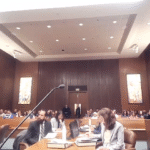The Department of Homeland Security (DHS), through U.S. Citizenship and Immigration Services (USCIS), is moving to fundamentally alter the national policy on immigration eligibility by proposing to rescind the current 2022 regulations governing the Public Charge Ground of Inadmissibility.
The Notice of Proposed Rulemaking (NPRM), scheduled for publication in the Federal Register on Wednesday, November 19, 2025, argues that the 2022 regulations are inconsistent with Congressional intent and hamper DHS’s ability to make accurate, precise, and reliable determinations. USCIS seeks to expand the Biden-era public charge policy, which critics fear could further restrict immigrants’ use of government benefits such as health, housing, and food assistance.
The proposal intends to restore broader discretion to immigration officers, empowering them to consider all individualized, case-specific factors, circumstances, and any empirical data relevant to an alien’s self-sufficiency. This means removing the limitations that only considered public cash assistance for income maintenance or long-term institutionalization. It thereby expands the scope for officers to consider the receipt of any means-tested public benefit in the forward-looking determination of whether an immigrant is likely to become a public charge.
This effort is framed as aligning policy with the long-standing goal that aliens in the U.S. should be self-reliant and that government benefits should not incentivize immigration.
The proposal outlines several specific deletions to Title 8 of the Code of Federal Regulations (CFR) to remove the current regulatory framework, including 8 CFR 212.20, 212.21, 212.22, and 212.23, which cover applicability, definitions, the determination process, and exemptions.
Crucially, DHS is also proposing to amend 8 CFR 103.6(c) relating to the cancellation and breach of public charge bonds. The amendment clarifies that the receipt of any means-tested public benefit during the effective period of a bond will now result in a breach.
The new proposed rule takes a comprehensive approach, meaning that if an immigrant uses safety net programs like Food Stamps or Medicare, that use will be a factor in determining whether to grant or deny a green card. Unlike the 2022 rule, which was similar to pre-2019 regulations and did not count benefits like food stamps or housing assistance against an applicant, the new rule extends the officer’s purview to review state-funded benefits as well. U.S. citizen children of non-citizens, however, are still eligible for these programs.
This proposed regulation from Homeland Security arrives amidst a climate where the Trump administration and Republicans in Congress have been leveling what critics call false claims of fraud concerning immigrants’ use of social safety programs. However, people without legal status are already ineligible for most public benefits, including Food Stamps, the healthcare marketplace, and Medicaid.
Historically, this policy has shifted dramatically. During his first term, President Trump expanded the range of benefits that could count as a Public Charge, making it much harder for applicants to get green cards and discouraging immigrants from seeking services they could access. The Biden administration’s 2022 rule was implemented to reverse Trump’s 2019 expansion, reverting to a rule where benefits like food stamps or housing assistance would not count against a green card applicant.
DHS’s analysis projects a significant economic consequence to the proposed rule, estimating an annual reduction in Federal and State transfer payments of approximately $8.97 billion. This is anticipated to result from immigrants and U.S. citizens in mixed-status households choosing to disenroll from or forgo enrollment in public benefits programs out of fear of jeopardizing their immigration status.
The NPRM opens a 30-day public comment period starting upon its publication on Wednesday, with DHS welcoming specific feedback on future policy tools.

